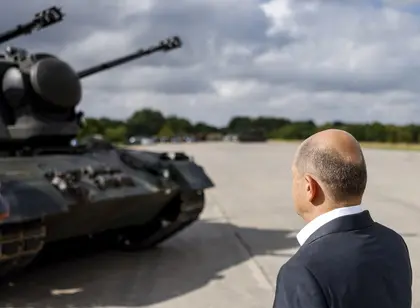German Chancellor Olaf Scholz on Monday pledged emphatic backing for Ukraine and other hopefuls to join the European Union, underlining however that enlarging the bloc to “30 or 36” would require reforms.
Scholz said he was “committed to” having the six nations of the western Balkans, Moldova, Georgia and Ukraine accede to the EU.
JOIN US ON TELEGRAM
Follow our coverage of the war on the @Kyivpost_official.
But as the bloc widened, each member’s veto right would have to go, said Scholz, with a transition to a “majority voting” system so as not to slow EU decision-making down.
Russia’s invasion of Ukraine was already putting the system of unanimity to the test, at a time when swift action was all the more necessary.
“Let’s seek compromises together. I could imagine for example, starting with majority voting in areas in which it is particularly important that we speak with one voice — in sanctions policy for example, or on issues relating to human rights,” he said.
Scholz added that member states are not faced with only two options of voting yes or no, but can also adopt “constructive abstention”.
In the speech on his vision for the bloc at Charles University in Prague, Scholz also underlined that the Ukraine war has laid bare the “uncoordinated shrinkage of European armed forces and defence budgets” which has to be rectified with “coordinated growth”.

Latest on Russia’s Intransigence to End War Against Ukraine
This meant greater cooperation between European businesses on armaments projects, joint manufacturing and procurement.
Germany, he said, will be ramping up “very significantly” on its air defence system, and also design it in a way that it could also be a shield for European neighbours from the Baltics to Scandinavia.
Scholz did not give details about the system but he had in March revealed plans to purchase an Israeli anti-missile shield system that could also offer protective cover for neighbouring EU states.
While that will be a long-term project, Berlin was already coordinating with the Netherlands on a “division of labour” on arming Ukraine, said Scholz as he urged other allies to join in the coordination.
“I can, for example, imagine that Germany will assume special responsibility in terms of building up Ukraine’s artillery and air defence capacities,” he said, vowing support for Kyiv for “as long as it takes”.
You can also highlight the text and press Ctrl + Enter










